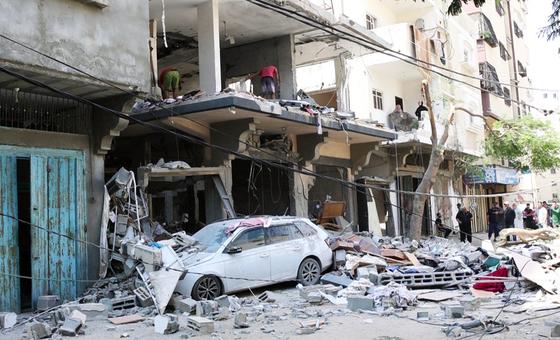“Over 1000 people have died and many more been injured following horrific acts of violence by Hamas on Saturday in Israel, and days of bombing by Israel in Gaza,” the WHO said in a statement on Tuesday.
The UN agency has offered assistance to health officials in both Israel and the occupied Palestinian territory.
On Monday, WHO Director-General Tedros Adhanom Ghebreyesus met with Egyptian President Abdel Fattah El-Sisi, who agreed to its request to facilitate the delivery of health and other humanitarian supplies from the agency to Gaza via the Rafah crossing.
WHO reported that hospitals in the Gaza Strip are running on back-up generators, with fuel likely to run out in the coming days. Additionally, supplies pre-positioned by WHO before the escalation have been exhausted,
“The life-saving health response is now dependent on getting new supplies and fuel to health care facilities as fast as possible,” said the agency.
As such, WHO are urgently working to procure medical supplies locally to meet demand while also preparing supplies from its hub in Dubai.
WHO also expressed grave concern over the health and well-being of hostages seized from Israel by Hamas, calling for their safe release.
Guterres deplores deadly bombing in Myanmar
Perpetrators behind the deadly bombing of displaced civilians in northern Myanmar must be held to account, UN Secretary-General António Guterres said on Tuesday.
Roughly 30 people, many of them women and children, were killed on Monday in an airstrike against a camp for internally displaced people in Kachin State, according to media reports.
UN Spokesperson Stéphane Dujarric said the Secretary-General was alarmed by the reports.
“The Secretary-General condemns all forms of violence, including the military’s intensifying attacks throughout the country, which continue to fuel regional instability. He continues to urge neighboring countries in particular to leverage their influence,” he said.
The UN chief also reaffirmed that civilians should be protected in accordance with international humanitarian law, he added.
Armenia: Severe psychological distress among refugee children
Refugee children arriving in Armenia from the Karabakh region are showing signs of severe psychological distress, the UN Children’s Fund (UNICEF) said on Tuesday.
UNICEF-support social workers operating in two safe spaces in the town of Goris reported that children are dealing with intense feelings of sadness, anxiety, fear and anger, manifesting in nightmares, bedwetting, and inconsolable crying.
Others have shut down and become detached, leaving them unable to express emotions or connect with the situation around them
More than 100,000 refugees from Karabakh have arrived in Armenia since the escalation of hostilities two weeks ago, Roughly a third of them are children.
UNICEF is working with the Armenian authorities and other partners to help refugee children access the care and support they need.

